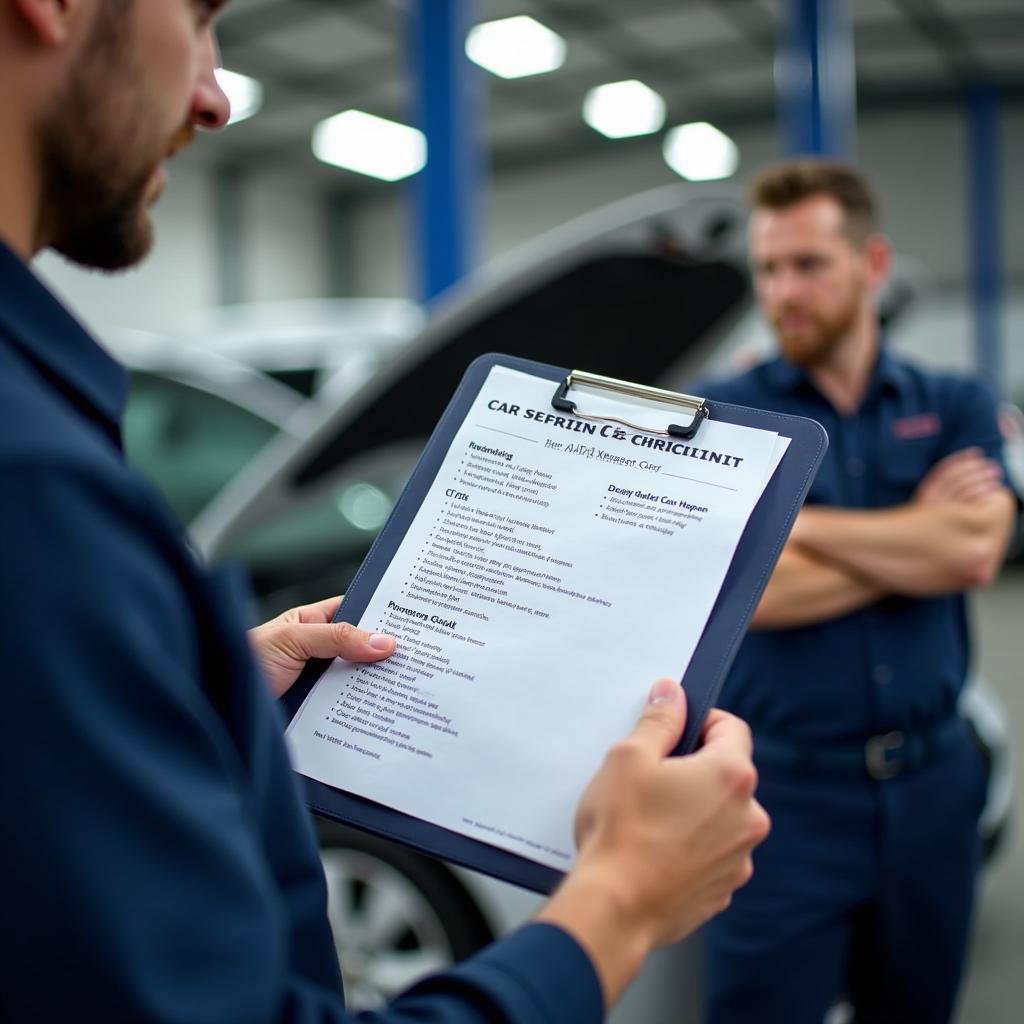A car service is more than just an oil change. It’s a comprehensive checkup for your vehicle that ensures it runs smoothly and safely. But What Does A Car Service Involve exactly? This article will guide you through the ins and outs of a typical car service, explaining the key checks and procedures involved.
Understanding the Importance of Regular Car Servicing
Before delving into the specifics, it’s crucial to understand why regular car servicing is non-negotiable for every car owner. Think of it like this: just like your body needs regular checkups to stay healthy, your car needs regular servicing to perform optimally and avoid costly repairs down the line. Regular servicing can:
- Enhance Safety: A well-maintained car is a safe car. Servicing ensures your brakes, tires, and other safety-critical components are in top condition.
- Improve Performance: Regular checks and maintenance help maintain your car’s engine health and fuel efficiency, giving you a smoother and more enjoyable ride.
- Increase Lifespan: Regular servicing can significantly extend your car’s lifespan by preventing minor issues from escalating into major problems.
- Retain Value: A car with a well-documented service history holds its value better when it comes time to sell or trade-in.
What to Expect During a Car Service
The specific checks and procedures involved in a car service can vary depending on the make and model of your car, its age, mileage, and the specific service schedule recommended by the manufacturer. However, here’s a general overview of what a typical car service includes:
1. Engine Oil and Filter Change
This is perhaps the most well-known aspect of a car service. Engine oil lubricates the moving parts of your engine, reducing friction and preventing wear and tear. Over time, the oil degrades and becomes less effective, necessitating a change. The oil filter traps dirt and debris from the oil, ensuring it stays clean and can do its job properly.
2. Fluid Level Checks and Top-Ups
Various fluids keep your car running smoothly, including coolant, brake fluid, power steering fluid, transmission fluid, and windshield washer fluid. During a car service, these fluid levels are checked and topped up as needed.
3. Tire Inspection and Inflation
Your tires are your only point of contact with the road, making their condition crucial for safety and performance. A car service includes a thorough tire inspection, checking for wear and tear, damage, and proper inflation pressure.
4. Brake System Inspection
Brakes are arguably the most critical safety feature of your car. During a car service, your brakes are inspected for wear and tear, and the brake pads and discs are checked for thickness and condition. Brake fluid levels are also checked and topped up as needed.
5. Battery Check
Your car battery provides the electrical power to start your engine and run various electrical components. During a service, the battery terminals are cleaned, and the battery’s charge and overall health are assessed.
6. Lights Check
All exterior lights, including headlights, taillights, brake lights, turn signals, and hazard lights, are inspected to ensure they are functioning correctly.
7. Air Filter Replacement
The air filter ensures clean air reaches your engine, which is essential for optimal combustion. A dirty air filter can reduce engine performance and fuel efficiency.
8. Spark Plug Check (if applicable)
Spark plugs ignite the air-fuel mixture in the engine cylinders. Over time, spark plugs can wear out, leading to reduced engine performance.
9. Visual Inspection
Beyond these specific checks, a car service also involves a comprehensive visual inspection of the entire vehicle. This includes checking for any signs of leaks, damage, corrosion, or wear and tear on various components, including the belts, hoses, suspension, exhaust system, and more.
Car Service vs. MOT Test: What’s the Difference?
It’s important to note that a car service is not the same as an MOT test. An MOT test is a legal requirement in many countries to ensure a vehicle meets minimum safety and environmental standards. While a car service aims to keep your car in optimal condition and prevent future problems, an MOT test is a pass or fail inspection that doesn’t involve any repairs or adjustments.
Conclusion
A car service is a vital part of car ownership, ensuring your vehicle’s safety, reliability, and longevity. By understanding what a car service involves, you can make informed decisions about your car’s maintenance and keep it running smoothly for miles to come. Remember, regular car servicing is an investment, not an expense.
Do you have any questions about car servicing? Check out our other resources:
Need personalized advice or assistance with your car service needs? Our team of experts is here to help. Contact us via WhatsApp at +1(641)206-8880 or email us at [email protected]. We offer 24/7 customer support for all your car service queries.


